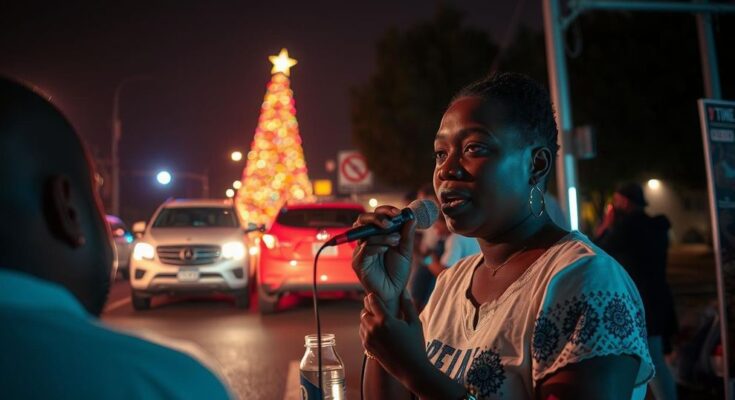Maputo faced significant unrest on Christmas Eve after a disputed election result confirmed the ruling Frelimo party’s victory, leading to protests, violence, and severe disruptions to public services amid claims of electoral fraud by opposition leader Venancio Mondlane.
The capital of Mozambique, Maputo, experienced unrest on Christmas Eve following a controversial confirmation of the ruling party’s victory in recent elections. Tensions arose as police confronted protesters in various neighborhoods, where demonstrators engaged in acts of vandalism and set makeshift roadblocks ablaze. Public services, including the local hospital, faced severe disruptions, with reports of numerous injuries and fatalities amid ongoing political turmoil. As residents remained largely indoors during a period typically filled with holiday festivities, the city lay under a pall of violence and uncertainty.
After the highest court of Mozambique upheld the election results, confirming that Daniel Chapo of the Frelimo party secured 65.17 percent of the vote, opposition leader Venancio Mondlane claimed electoral fraud. This assertion has exacerbated fears of violence between rival supporters, while acts of looting have plagued numerous establishments throughout the capital and echoed in cities across northern Mozambique. Chapo’s confirmation as president has sparked calls for “electoral truth” among citizens, creating an atmosphere of discord as many express dissatisfaction with the electoral process.
In the face of these challenges, local hospitals reported a surge in patients, highlighting the critical nature of public health amidst civil unrest. The public’s usual Christmas Eve activities were curtailed, with many opting to stay indoors due to safety concerns. The unrest, which has spread to other regions of Mozambique, serves as a stark reminder of the deep-seated political divisions that continue to plague the nation.
Overall, the recent violence underscores the need for reconciliation and dialogue. Chapo’s call for unity indicates a recognition of the fractures within society, while Mondlane’s declarations speak to the urgency of reforming the electoral process to ensure greater transparency and equity in governance.
Mozambique’s political landscape has been tumultuous, especially following recent elections that have ignited public outcry and claims of irregularities. The ruling Frelimo party’s incumbent, Daniel Chapo, has secured a controversial victory, leading to widespread protests and unrest across the capital and other provinces. Opposition leader Venancio Mondlane’s assertion of electoral fraud has intensified tensions, calling into question the legitimacy of the electoral outcomes and raising fears of retaliatory violence between political factions. The situation highlights the fragility of Mozambique’s democratic processes and the increasingly polarized nature of its political environment.
The unrest in Maputo on Christmas Eve symbolizes the broader discontent among the populace regarding the integrity of the electoral process in Mozambique. With significant casualties and property destruction reported, the urgency for political dialogue and reform is clear. While Chapo calls for unity, Mondlane’s continued accusations signify a deep divide that poses challenges to national stability. Moving forward, the need for transparency, accountability, and reconciliation will be essential in restoring public trust and maintaining peace in the country.
Original Source: www.barrons.com




